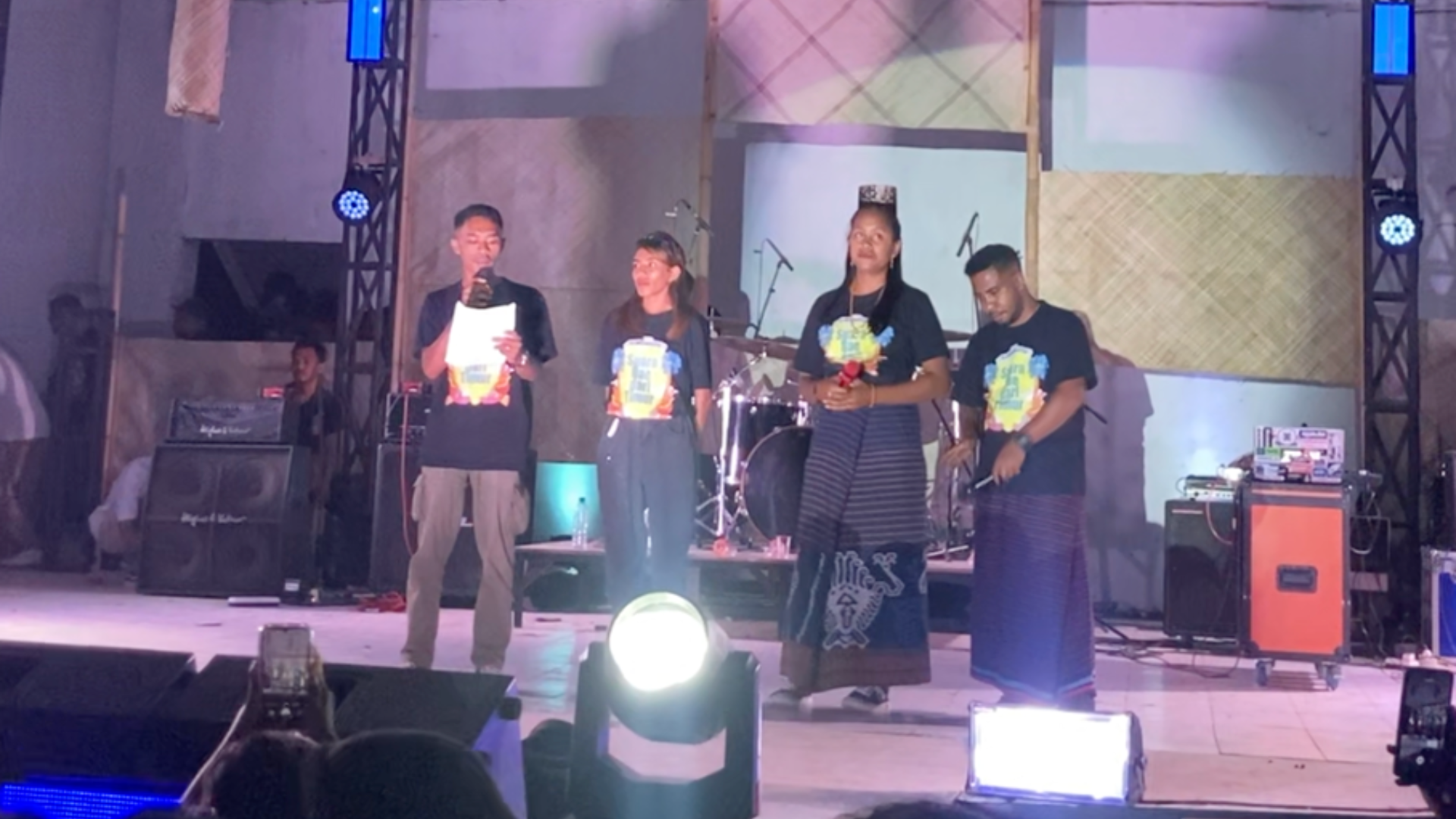
Climate Justice | October 15, 2024
Injustice in Development & Economy in East Nusa Tenggara (NTT) Intensifies the Double Burden of Communities Facing the Climate Crisis
Humanis Foundation
VOICES OF THE YOUTH AND FLOBAMORATAS[1] COMMUNITY
Injustice in Development & Economy in East Nusa Tenggara (NTT) Intensifies the Double Burden of Communities Facing the Climate Crisis
East Nusa Tenggara (NTT) is an archipelago highly vulnerable to the impacts of the climate crisis. This crisis leads to an increase in the intensity and frequency of natural disasters such as floods, droughts, and coastal erosion, significantly affecting the lives of the community, especially the farmers, fishermen, urban communities, and Indigenous communities that depend on natural resources.
The Main Problems
- Injustice and Inequality:
- Economic and Social Disparities: Limited space for young people and low-income communities to develop due to discrimination and limited information, especially when dealing with the challenges of the climate crisis.
- Gender Discrimination: Women in the agricultural sector face gender discrimination in wages, as they receive lower pay despite bearing the same workload as men. This matter makes it even more difficult for women to cope with the impacts of the climate crisis.
- Inequity in Education Access: Limited access to education due to high cost or long distance leads to significant educational disparities, reducing communities’ ability to cope with the climate crisis.
- Lack of Community Engagement:
- Unclear Policies and Regulations: The absence of clear regulations governing environmental and waste issues in coastal areas and the lack of socio-economic policies addressing small businesses make communities vulnerable and reduce their ability to adapt to the climate crisis.
- Limited Community Role in Decision-Making: The lack of community involvement in the planning and implementation of development and conservation programs leads to losses for local communities, especially in dealing with natural disasters caused by the climate crisis.
- A Gap in Access to Basic Services: Limited access to clean water, inadequate waste management, and insufficient infrastructure are significant obstacles for communities, particularly in coping with the impacts of the climate crisis.
- Threats to the Environment and Food Security:
- Coastal Ecosystem Damage: The construction of jogging tracks in coastal areas without considering government regulations and the government’s slow response to the construction of breakwaterhave damaged the coastal environment. This matter has increased vulnerability to abrasion and tidal flooding.
- Limited Moorings for Fishermen: Development in coastal areas has led to the loss of moorings for small fishermen, threatening the livelihoods and food security of the community, especially in the face of extreme weather due to the climate crisis.
- Plastic Waste Pollution: Unresponsible disposal of plastic waste damages the marine environment and ecosystem, resulting in economic losses and reducing the ocean’s ability to absorb carbon.
- Indigenous Peoples Issues:
- Lack of Recognition and Protection: The lack of recognition and protection of Indigenous Peoples’s right leads to conflicts over land tenure, loss of living space, and hardships for Indigenous communities, especially in the face of threats to Indigenous forests and territories due to the climate crisis.
- Limited Involvement in Decision Making: Indigenous Peoples are rarely involved in the planning and implementation of conservation projects and management of Indigenous forests, resulting in setbacks for Indigenous communities, especially in preserving traditional and local practices to address the impacts of the climate crisis.
The youths, farmers, fishermen, and the Flobamoratas Indigenous community came together to voice and formulate 15 recommendations as follows:
- Promote sustainable and adaptive natural resource management in coastal areas, customary forests, and agricultural lands. The policy formulation process should involve farmers, fisherfolks, indigenous communities, the urban poor, and vulnerable groups affected by the climate crisis.
- Demand regulations to recognize and protect Indigenous communities and their traditional rights, including their rights to manage land, sea, and forests, cultural/customary sites. Ensure the consent/Free Prior Informed Consent of Indigenous communities before development in customary areas and ratify the Indigenous Peoples Bill.
- Demand the government to accelerate infrastructure development that is inclusive and equitable. Clean water, electricity, education, and health are properly distributed in coastal, rural, and urban areas. The welfare of farmers, fisherfolks, Indigenous communities, the urban poor, and vulnerable groups affected by the climate crisis must be a top priority.
- Encourage policies that increase access to energy with equitable, decentralized (not large-scale) renewable energy sources. Involve communities and prioritize respect for human rights, not marginalize the living space of Indigenous and local communities, and bring about increased welfare and gender justice.
- Demand equality for women in access, participation, control, and benefits in every planning and implementation of policies at the regiona and nationall level related to the environment, energy, and natural resources.
- Encourage the government to implement a waste management system that involves local communities in coastal, urban, and rural areas to create a clean and healthy environment. Ask for extended producer responsibility (EPR) in waste management and to create environmentally friendly products.
- Transparency is the foundation of trust. We demand that local government budgets be open and accessible to the public. Farmers, fishermen, and Indigenous Peoples must be actively involved in the regional development planning process so that the policies taken will reflect the needs and aspirations of citizens, not just numbers on paper.
- Stop unsustainable large-scale monoculture farming programs, such as TJPS (Tanam Jagung Panen Sapi/plant corn harvest cows) and Food Estate, and switch to supporting the development of community-based local food systems and consider the local wisdom.
- Enforce the Basic Agrarian Law that provides certainty and protection for farmers from land conversion, so that farmers can be sovereign over their food.
- Protect small fisherfolks by ensuring the managed area is based on local wisdom, preventing coastal privatization, and simplifying bureaucracy for fisherfolks to apply some permits and administration at the nearest agency without burdening them with long bureaucratic paths.
- Provide insurance and compensation for loss and damage to fishing gear for fisherfolks and coastal communities affected by climate change.
- Reject future development projects such as mining, geothermal, and large-scale solar energy that are unjust, environmentally damaging, and marginalized vulnerable groups.
- Restore ecosystems and the rights to living space for local communities and provide funds to restore the impacts of health, environmental degradation, and loss of livelihoods due to development projects that are unjust and marginalize the rights of vulnerable groups such as mining, geothermal, large-scale solar energy, etc. Encourage a just energy transition.
- Improve trade and food price stability as a protection mechanism for farmers, fisherfolks, and consumers. Ensure data transparency and accountability for food policies managed in an inclusive, transparent, and accountable manner.
- Encourage the formation of regulations at the level of laws that can address the climate crisis holistically by prioritizing the substance and dimensions of climate justice, including recognition justice, distributive justice, procedural justice, and restorative justice, as well as gender justice.
Maumere, 26 September 2024
The Youths, Farmers, Fishermen, and Indigenous People of Flobamoratas.
[1] Flobamoratas is an abbreviation of the names of large islands in East Nusa Tenggara (Flores, Sumba, Timor, Rote, Alor, Lembata, dan Sabu)

